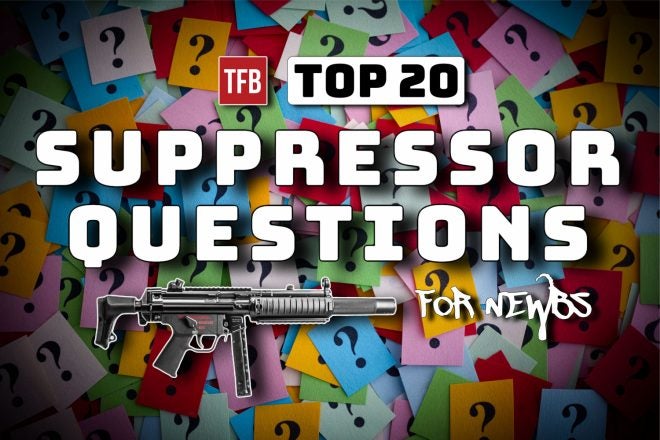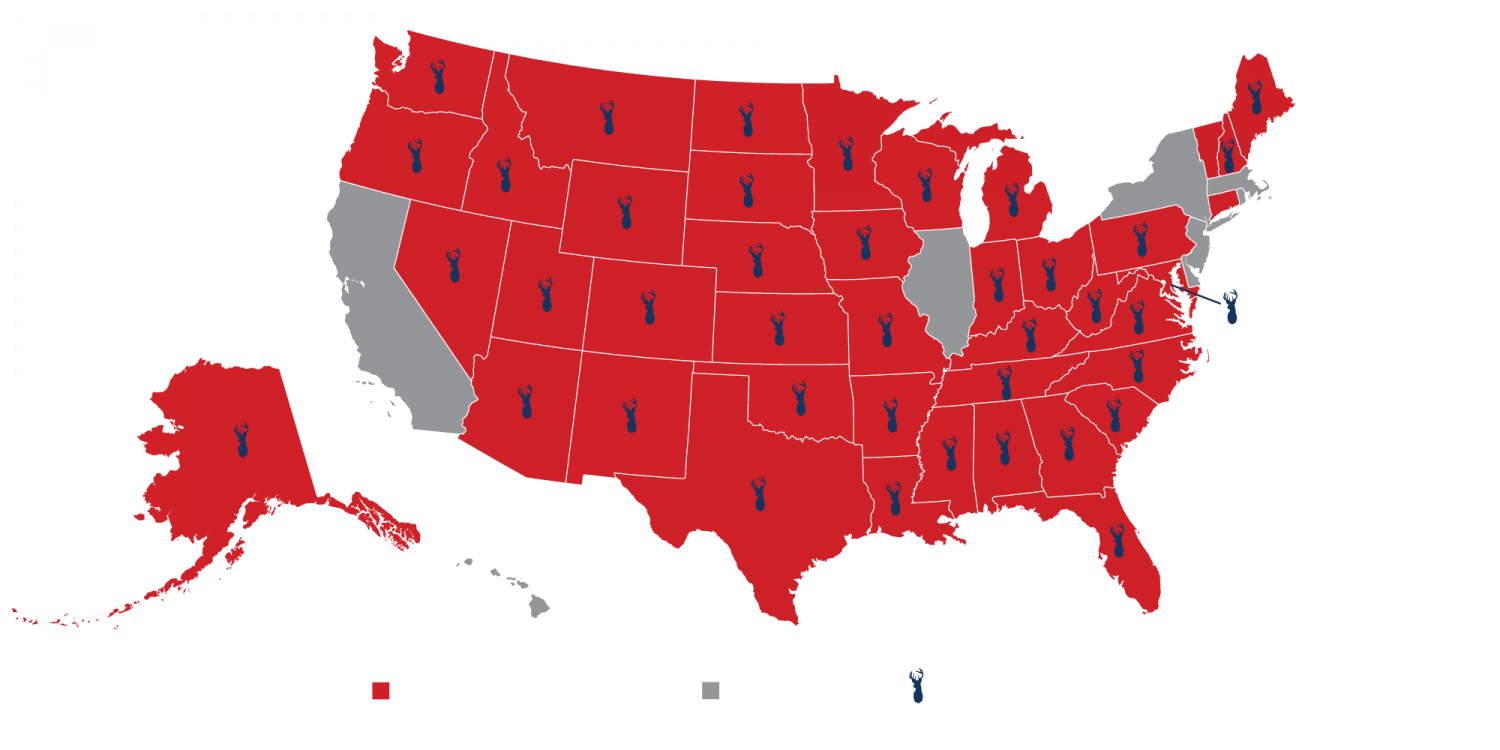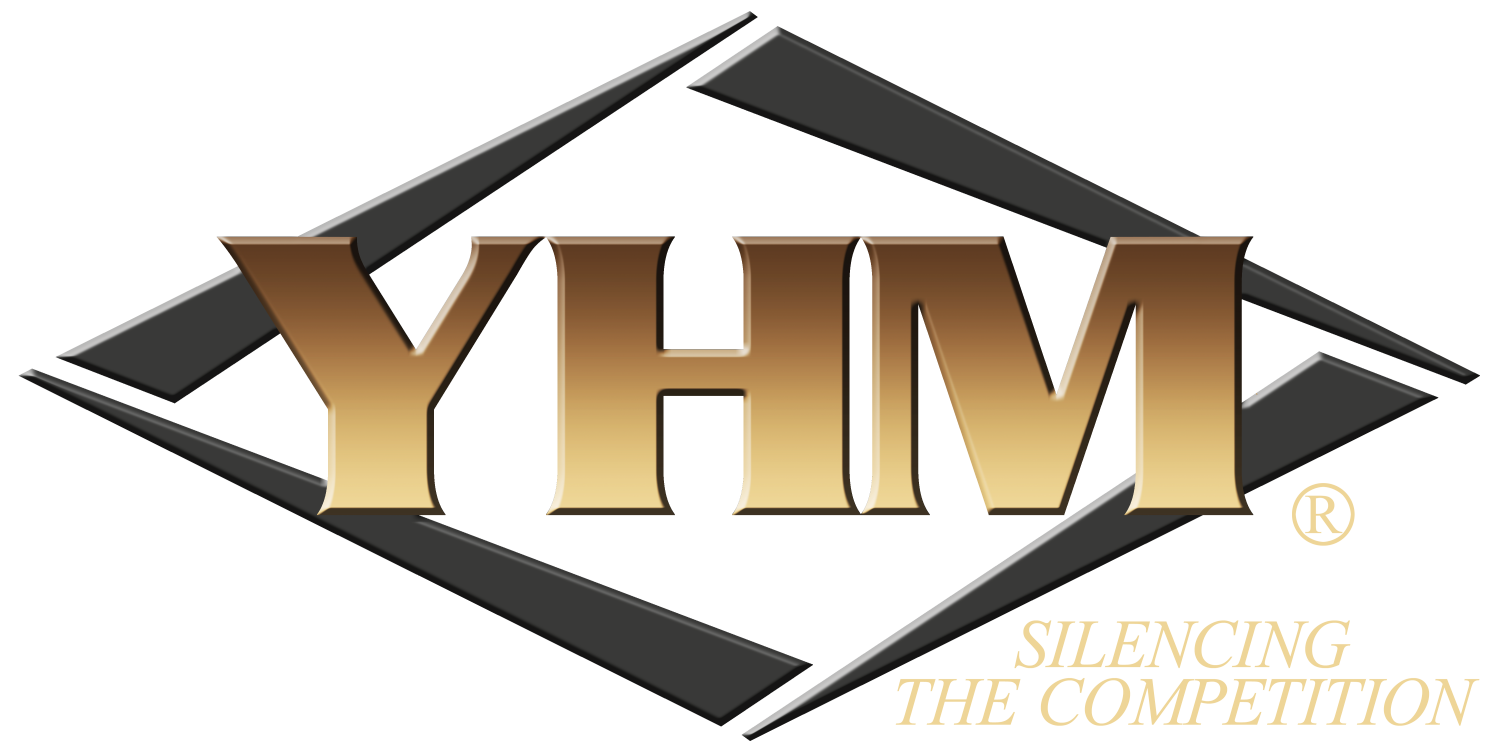Good morning everyone and welcome back to another Silencer Saturday brought to you by Yankee Hill Machine, manufacturers of the small but mighty Turbo K 5.56 rifle suppressor. Last week we talked about the NFA Registry and all the various numbers behind it. This week we are going to answer the top 20 suppressor questions for those of you that are new to our addiction. Veteran suppressor owners may want to chime in with their thoughts and experiences as well. Let’s take a look.
SILENCER SATURDAY #166: Top 20 Suppressor Questions For Newbs
We all have to start somewhere. And while there are definitely stupid questions, you should definitely ask them so that we can 1) laugh at you later and 2) remember back to when we started out and others laughed at our stupid questions. The goal is to get as many shooters and gun owners to also become silencer owners. And the only way to do that is through education about the laws, application process, responsible ownership and getting the most enjoyment out of your suppressor. Let’s get to the top 20 suppressor questions.
1. Are Silencers Legal?
Yes, silencers are legal – that is as long as you live in a state that allows for civilian ownership. Federally, suppressors have been heavily regulated under the National Firearms Act (NFA) of 1934 and subsequent legislation. Silencers are not legal for common citizens to own in California, Delaware, District of Columbia, Hawaii, Illinois, Massachussetts, New York, New Jersey, and Rhode Island.
2. Do I Need A Special License To Own A Suppressor?
There is no such thing as a Class 3 License to own NFA items like a suppressor. There is no such thing as a silencer license. Silencer owners are required to pay a tax and complete an application as part of the NFA transfer and registration process.

SILENCER SATURDAY #166: Top 20 Suppressor Questions For Newbs
3. Is It Called A Silencer Or A Suppressor?
Legally, they are silencers – all U.S. regulations refer to these devices as either silencers or mufflers. Functionally, suppressor is a better term since they work to suppress noise and flash, not silence the report of a firearm. But, because all legal documents refer to these devices as silencers, that is what they should be called, even though the two terms are interchangeable in conversation.
4. How Much Do Suppressors Cost?
Typical suppressors run from $200 for a simple rimfire model to nearly $2000 for a centerfire precision rifle model. However, most models land somewhere between $500-$850.
5. How Do I Buy A Suppressor?
Long story made short: visit a silencer dealer (FFL/SOT) either online or in person, pick out the make and model you want and buy it. You’ll need to submit an application, photographs and fingerprints and pay a $200 tax. Submit the application package and wait for approval so you can pickup your silencer – typically five to six months. Online retailers like Silencer Shop make the process very simple.
- SILENCER SATURDAY #126: 10 Suppressor Buying Tips For Beginners
- SILENCER SATURDAY #23: Suppressor Buyer’s Guide Part II
- SILENCER SATURDAY #19: Suppressor Buyer’s Guide Part I
6. What Are The Benefits Of Using A Suppressor?
Noise reduction is typically the focus for new suppressor buyers. But flash reduction, perceived recoil control, blast reduction and overall signature mitigation are important attributes to a good suppressor as well.

SILENCER SATURDAY #166: Top 20 Suppressor Questions For Newbs
7. What Are The Downsides Of Using A Suppressor?
Adding weight to the most forward (and furthest from you) part of a firearm can cause fatigue, change point of aim/point of impact calculations and retain heat which can create a mirage effect obscuring the target using some optics. For semiautomatic rifles, especially those that are direct impingement systems like the AR-15 family, cyclic rates can increase and gas and particulate blowback can blow towards the shooter. Obviously cost and wait times are a downside, but we covered those in purchase process above.
8. Can I Build My Own Silencer?
Absolutely, as long as you follow all the correct legal steps to avoid possible criminal charges. The ATF Form 1 application allows individuals to make NFA items like silencers, provided they follow the same background check process, pay the $200 and wait for approval before making any parts.
9. Can My Friend Borrow My Suppressor?
The short answer is no, the registration and transfer paperwork is for the person listed on your approved ATF Form 4 and must remain in control of that individual. The long answer is that if you use an entity like a trust or an LLC to transfer a suppressor, anyone designated as a responsible person can posses the suppressor. Responsible persons also need to submit a questionnaire, fingerprints, photographs and undergo a background check.
10. Does The ATF Have The Right To Search My House If I Own A Silencer?
No. Owning NFA items does not mean you have to surrender your 4th Amendment rights of search and seizure to the government.
11. What Are Suppressors Made Of?
Most suppressors are made of aluminum, steel alloys and titanium or a combination of those materials.
12. What Are The Top Suppressor Manufacturers In The United States (Alphabetical)?
- AMTAC
- Bowers Group
- CGS
- Dead Air
- Energetic Armament
- Gemtech
- Griffin Armament
- GSL Technology
- Innovative Arms
- Knight’s Armament
- OSS
- Q
- Rugged
- SureFire
- Sig Sauer
- SilencerCo
- Thompson Machine
- Thunder Beast Arms
- Yankee Hill Machine
13. Can I Buy A Foreign Made Suppressor?
No, the importation of suppressors into the U.S. is limited to law enforcement and military use only.
14. Can I Buy One Suppressor To Use On All Of My Guns?
Yes, there are multi-caliber and multi-use suppressors on the market that will work on a variety of different hosts. However, one suppressor for all your guns will not perform as well as dedicated suppressors purchased (or made) for each host.

SILENCER SATURDAY #166: Top 20 Suppressor Questions For Newbs
15. What Happens If I Damage My Suppressor?
The companies listed above all have excellent warranties and will fix damaged silencers with (almost) no questions asked. You should be able to send your suppressor via UPS or FedEx directly to the manufacturer for repair work and it can be returned directly to your home address of record. In the very unlikely event of catastrophic damage to the serialized part of your silencer, a new Form 4 application, $200 tax payment and background check will be required.
16. What Is The Quietest Silencer?
Quietest suppressor is a very subjective term and will depend more on the types of ammunition used, barrel length and host type (semiautomatic versus bolt action, for example). Generally, a good rimfire silencer, shooting subsonic ammunition in a closed action host will be about as quiet as you can get.
17. Do I Need To Clean My Suppressors?
Rimfire and other suppressors that will shoot unjacketed Ammo will need to be cleaned every 1,000+ rounds. High velocity rifle host suppressors rarely need to be cleaned.
18. Do I Need To Use Special Ammunition With My Suppressors?
Always read the owners manual and follow the manufacturer’s guidelines for the calibers and pressures allowed in a suppressor. For the quietest results, subsonic ammunition is usually preferred to avoid the crack associated with supersonic projectiles.
19. Can I Hunt With My Suppressor?
Currently there are 40 states that allow the use of suppressors while hunting.
20. Do i need to carry my tax stamp with me when i shoot with my suppressor?
There is no requirement to carry around your approved Form 1 or Form 4 and tax stamp when you use your suppressor at a range or while hunting. By law, an ATF agent can request proper documentation for an NFA item, but there is no specific rule or law requiring your stamp be ready and available. Even though the chances of having an ATF agent asking to see proof of registration for your silencer are extremely slim, keeping digital copies on your phone may give you extra peace of mind.
Hopefully, that answered some of your most basic suppressor questions. If I messed something up or left one off the list, please let me know in the comments section below.
Be safe, have fun and we’ll see you here next weekend for another Silencer Saturday.
Silencer Saturday is Sponsored by Yankee Hill Machine
 Your Privacy Choices
Your Privacy Choices


